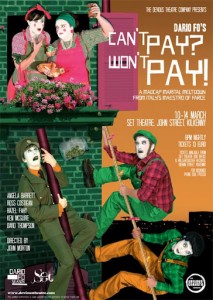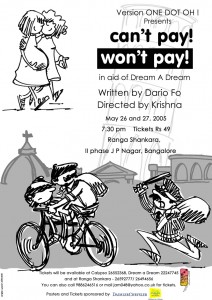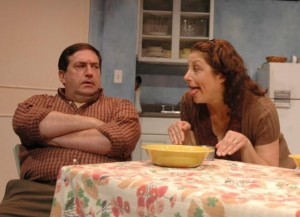OWS occupied a square for a day this afternoon in Washington Square Park. The fountain was encircled with tables from working groups, the Octopus puppet and the drummers were there. It was quite like old times–from two months ago. Not wanting to be left out the police arranged their own gathering on the North side of the square but failed to consense on an action, so Occupy Town Square went ahead.
In the fall, I was active in Occupy Washington Square Park, so it was nice to be back in the Square. The Education and Empowerment working group did a great job–there were protest song teach-ins, walking tours of corporate interests around the Square, books from the OWS library: and in a collaborative effort with Direct Action and the Performance Guild, we performed scenes from Dario Fo’s 1974 classic play Can’t Pay! Won’t Pay!
The performance project came about from a discussion at the Occupy Student Debt Campaign when we were looking for a slogan for the launch. I suggested “Can’t Pay, Won’t Pay” and I quickly had to disavow any originality. It seemed that I finally found something I could do for Occupy–remember things that happened long before most of the activists were born. Fo’s play was first written and performed by himself, his wife Franca Rame and the theatre group Collettivo Teatrale La Comune in 1974.
It was based on the auto-reduction movement in Italy, in which women and men refused to pay price increases in shops, increased rent and other price hikes, while their own wages were stagnant. These actions were part of the operaismo or worker’s power that has been so influential in academic circles of late via Paolo Virno, and other Autonomia writers.
The play is still performed worldwide from debt-destroyed Ireland to supposedly-booming India:
When Greek citizens started to refuse to pay new road tolls and other imposed tax increases, the parallel was noticed at once. Now actively described as the “I Won’t Pay” movement, it’s likely to grow in size now that Germany is demanding that a European Union commissioner be imposed to run the Greek economy. In the US, any such movement is seen as a moral failing on the part of the debtor, rather than a social crisis in which unreasonable prices and interest rates are imposed on citizens.
So Can’t Pay! Won’t Pay! is a play whose time has once again come. In the scenes performed today, Antonia and Margherita describe how a group of women banded together to refuse to pay increased prices in the supermarket. Then Margherita’s husband, Giovanni, a play-by-the-rules middle-of-the-road type reports his amazement that his workmates refused to pay for the mediocre food at increased prices in the works canteen. Any investigations into the identity of the mediocre “actor” playing Giovanni today will be summarily dismissed;) So in two short scenes issues of striking, price refusal and feminism were raised.
While the play felt a little dated and the UK English translation lost people in places, the good-humored little audience watching enjoyed the rehearsal and stayed around to discuss debt refusal and other issues.
In this group were two mothers who are being pursued by Citibank for student debt incurred by their children, which is being repaid, only not fast enough for the bank’s liking. We heard about a popular refusal of mortgage debt in Hungary, where debtors deposited bricks outside the Parliament building. Thousands participated, prompting the government to allow a revision of foreign currency mortgages that had been very popular (as in Iceland) before 2008 but were now ruinous.
Can’t pay? Won’t pay!




Hi Michael,
so nice to hear from you! I took Mira Schor’s advice (via FB) and stopped looking at the stats, it’s a mistake to know or care–WordPress put it right in the meu bar now so it’s always there. Good point about RSS, although I was assured by digital media types this week that RSS is dead…
Back to the point–it’s interesting to see the revival of interest in radical theatre from the last era of financial crisis: next up 7:84! who were on to the 99% thing way back when.
7:84? Perfect! [To keep up with campus walkout last spring I organized a reading near the Capitol of Waiting for Lefty, which fit with a class, but which felt close to useless as a radical theatre model.]
The ACT UP / Gran Fury piece is also great.
If RSS is dead, did people just go back to checking bookmarks or something?
Good question–I think the geek thing is to use ReadLater and Instapaper, things like that–but plenty of people appear to be using the RSS here.
It’s a buzz to see the energy of ACT UP/Gran Fury, and a reminder–a decade of full-on activism before things got better (at least in the US)
I was just thinking about this play, and Fo and Rame in general. Great stuff.
And great blog, Nick, one of my favorite things to read everyday. Your topic, your voice and your format all come together here.
[I think you made a comment a few days ago about declining hits or something, and I just wanted to remind you that a lot of us follow the RSS feed!]
As they say, keep up the good work.